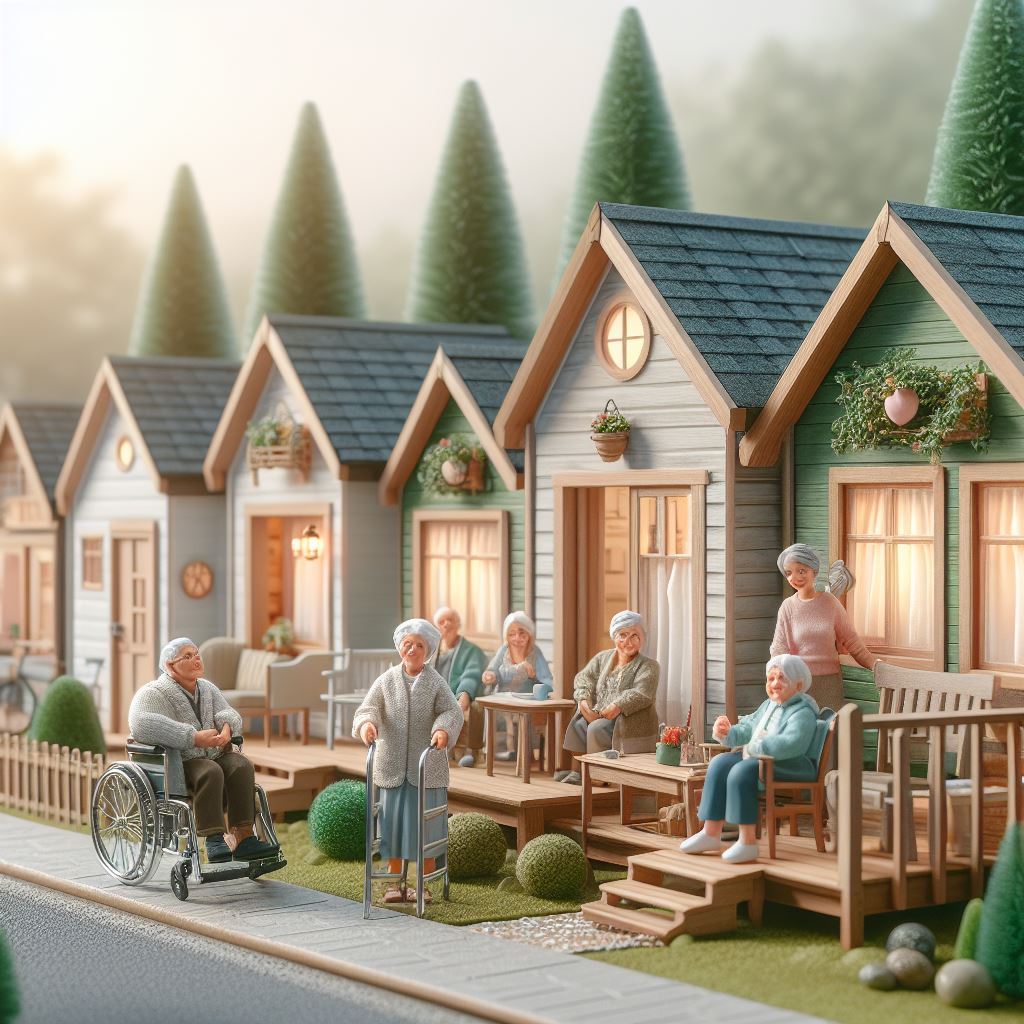A Model for Maintaining a Permanent Inventory of Affordable Senior Housing in Lewis, Mason and Thurston Counties
 What follows is an exploration of some possibilities for creating a permanent inventory of small, affordable housing units for seniors and adults with disabilities for the tri-county region of Lewis, Mason and Thurston counties in Western Washington state.
What follows is an exploration of some possibilities for creating a permanent inventory of small, affordable housing units for seniors and adults with disabilities for the tri-county region of Lewis, Mason and Thurston counties in Western Washington state.
As a starting point for discussion, 100 units of simple, standalone, single story structures of 600 sq ft or less (perhaps “park model” mobile homes) that could be rented for $300-$500/month, a target representing roughly 30% of social security payments. While we’re visualizing numbers, the target cost for each unit might be $50,000 or less.
This community would be built on land acquired for the purpose in rural parts of the counties to minimize the cost of acquisition and to avoid excessive zoning restrictions and NIMBY reactions from urban neighbors. It should also make the project eligible for USDA funding.
If a dairy, or other farm could be found, it would be ideal because the farmhouse would serve as a ready made administrative building and some water, electricity and other infrastructure would already be in place.
The organization of the community would be as a resident owned, non-profit housing cooperative in which each resident would have a vote in the governance of the community and in capital expenditures. There would be no individual ownership of housing, but residents in good standing with the cooperative could reside there as long as it served them. Units vacated by residents would be available for new coop resident members, approved by a member committee upon review of an application.
New members would be approved by a board comprised of elected directors upon the basis of criteria such as applicants’ level of need, the ability of the community to meet their needs, and what needs of the community might be served in terms of applicants’ skills and experience relevant to advancing the community’s objectives in service and sustainability.
Membership should be a small nominal sum, and be non-transferable, with no cash value. It would continue as long as the resident abides by the rules of the cooperative, or they no longer have need of the housing. Units vacated by community residents would be made available to new applicants at the established monthly rate. This would ensure that affordable housing would continue to be available in the counties and not sold to private parties for profit, or handed down to heirs.
A mixture of seniors and some working age adults, possibly working in care-giving fields would provide support to residents with infirmities and more robust seniors might provide childcare or mentoring to the children of working age parents.
The overriding mission of the cooperative is to maintain a mutually supportive community in which members’ assist according to their abilities, aptitudes and inclinations by helping their neighbors with tasks they can no longer perform. Regular community gatherings and activities should be organized. Ride sharing for shopping and medical appointments could be arranged among community members making such tasks easier and more enjoyable for all concerned.
Volunteering in later life is associated with better cognitive function — specifically, better executive function and episodic memory, according to a new study from UC Davis Health presented at the Alzheimer’s Association International Conference 2023 in Amsterdam.
“We hope these new data encourage individuals of all ages and backgrounds to engage in local volunteering — not only to benefit their communities, but potentially their own cognitive and brain health,” said Donna McCullough, Alzheimer’s Association chief mission and field operations officer.
By fostering connections within the community and encouraging volunteerism, we can provide residents with a sense of belonging and purpose so important to their health and well-being.
Resources for Implementation
Counties may already have tracts of land under their purview suitable to develop. Grants can be sought from such entities as the USDA, HUD, Administration for Community Living, Older Americans Act funds and other local and regional governments with an interest in securing safe, affordable, sustainable housing for their most vulnerable citizens.
Partnership organizations might include the Lewis Mason Thurston Area Agency on Aging, Northwest Cooperative Development Center, Quixote Communities, Senior Services for South Sound, Providence Health & Services, Panorama, Catholic Community Services, Consumer Direct Washington, United Way, the Senior Action Network, Timberland Regional Library System, senior centers, faith groups and other social benefit organizations and local governments.
If we can enlist the aid of service-minded community members and organizations to help provide an environment where our seniors can thrive, and express their best “elder” selves, maybe we can also be an antidote to the despair younger people feel at the prospects of their own aging. If we want our youth to be invested in maintaining a functioning civil society, we should demonstrate that growing old in our society is not entirely a losing proposition. Inter-generational and mentoring programs in the community should be encouraged.
Anyone aged 50+ is invited to join the Elderhood, or Elders in the Hood as one friend called it. Let us strive to “be the elders you want to see in the world” to borrow from Gandhi, himself an exemplary elder of renown.
Obviously, there are innumerable details to be addressed as they arise. Your input, corrections, questions and criticisms are welcome. Feel free to share with anyone you think has an interest in such a program and might like to participate in some way.
We look forward to hearing from you!
